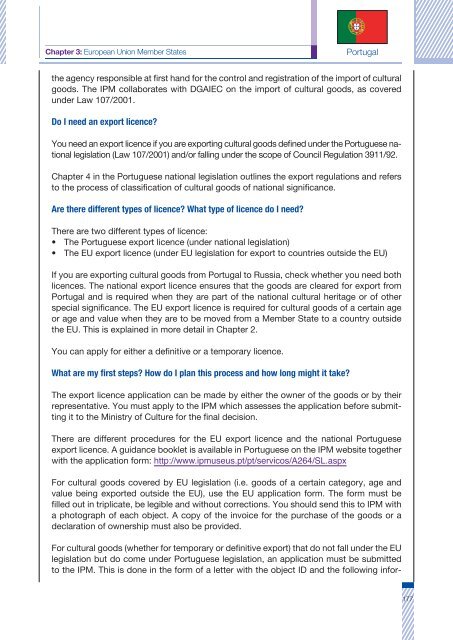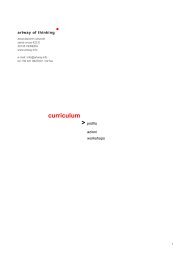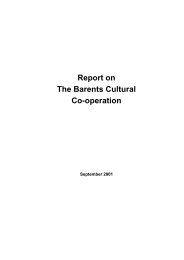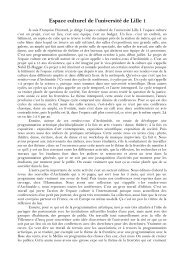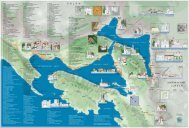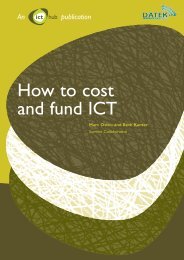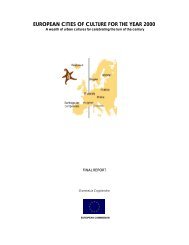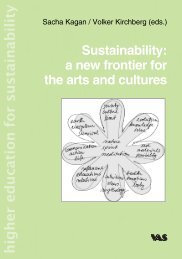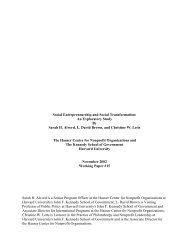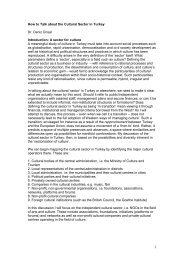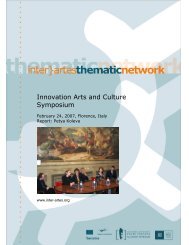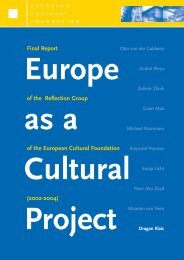A guide to the export and import of cultural goods between Russia ...
A guide to the export and import of cultural goods between Russia ...
A guide to the export and import of cultural goods between Russia ...
You also want an ePaper? Increase the reach of your titles
YUMPU automatically turns print PDFs into web optimized ePapers that Google loves.
Chapter 3: European Union Member States<br />
Portugal<br />
<strong>the</strong> agency responsible at first h<strong>and</strong> for <strong>the</strong> control <strong>and</strong> registration <strong>of</strong> <strong>the</strong> <strong>import</strong> <strong>of</strong> <strong>cultural</strong><br />
<strong>goods</strong>. The IPM collaborates with DGAIEC on <strong>the</strong> <strong>import</strong> <strong>of</strong> <strong>cultural</strong> <strong>goods</strong>, as covered<br />
under Law 107/2001.<br />
Do I need an <strong>export</strong> licence?<br />
You need an <strong>export</strong> licence if you are <strong>export</strong>ing <strong>cultural</strong> <strong>goods</strong> defined under <strong>the</strong> Portuguese national<br />
legislation (Law 107/2001) <strong>and</strong>/or falling under <strong>the</strong> scope <strong>of</strong> Council Regulation 3911/92.<br />
Chapter 4 in <strong>the</strong> Portuguese national legislation outlines <strong>the</strong> <strong>export</strong> regulations <strong>and</strong> refers<br />
<strong>to</strong> <strong>the</strong> process <strong>of</strong> classification <strong>of</strong> <strong>cultural</strong> <strong>goods</strong> <strong>of</strong> national significance.<br />
Are <strong>the</strong>re different types <strong>of</strong> licence? What type <strong>of</strong> licence do I need?<br />
There are two different types <strong>of</strong> licence:<br />
• The Portuguese <strong>export</strong> licence (under national legislation)<br />
• The EU <strong>export</strong> licence (under EU legislation for <strong>export</strong> <strong>to</strong> countries outside <strong>the</strong> EU)<br />
If you are <strong>export</strong>ing <strong>cultural</strong> <strong>goods</strong> from Portugal <strong>to</strong> <strong>Russia</strong>, check whe<strong>the</strong>r you need both<br />
licences. The national <strong>export</strong> licence ensures that <strong>the</strong> <strong>goods</strong> are cleared for <strong>export</strong> from<br />
Portugal <strong>and</strong> is required when <strong>the</strong>y are part <strong>of</strong> <strong>the</strong> national <strong>cultural</strong> heritage or <strong>of</strong> o<strong>the</strong>r<br />
special significance. The EU <strong>export</strong> licence is required for <strong>cultural</strong> <strong>goods</strong> <strong>of</strong> a certain age<br />
or age <strong>and</strong> value when <strong>the</strong>y are <strong>to</strong> be moved from a Member State <strong>to</strong> a country outside<br />
<strong>the</strong> EU. This is explained in more detail in Chapter 2.<br />
You can apply for ei<strong>the</strong>r a definitive or a temporary licence.<br />
What are my first steps? How do I plan this process <strong>and</strong> how long might it take?<br />
The <strong>export</strong> licence application can be made by ei<strong>the</strong>r <strong>the</strong> owner <strong>of</strong> <strong>the</strong> <strong>goods</strong> or by <strong>the</strong>ir<br />
representative. You must apply <strong>to</strong> <strong>the</strong> IPM which assesses <strong>the</strong> application before submitting<br />
it <strong>to</strong> <strong>the</strong> Ministry <strong>of</strong> Culture for <strong>the</strong> final decision.<br />
There are different procedures for <strong>the</strong> EU <strong>export</strong> licence <strong>and</strong> <strong>the</strong> national Portuguese<br />
<strong>export</strong> licence. A guidance booklet is available in Portuguese on <strong>the</strong> IPM website <strong>to</strong>ge<strong>the</strong>r<br />
with <strong>the</strong> application form: http://www.ipmuseus.pt/pt/servicos/A264/SL.aspx<br />
For <strong>cultural</strong> <strong>goods</strong> covered by EU legislation (i.e. <strong>goods</strong> <strong>of</strong> a certain category, age <strong>and</strong><br />
value being <strong>export</strong>ed outside <strong>the</strong> EU), use <strong>the</strong> EU application form. The form must be<br />
filled out in triplicate, be legible <strong>and</strong> without corrections. You should send this <strong>to</strong> IPM with<br />
a pho<strong>to</strong>graph <strong>of</strong> each object. A copy <strong>of</strong> <strong>the</strong> invoice for <strong>the</strong> purchase <strong>of</strong> <strong>the</strong> <strong>goods</strong> or a<br />
declaration <strong>of</strong> ownership must also be provided.<br />
For <strong>cultural</strong> <strong>goods</strong> (whe<strong>the</strong>r for temporary or definitive <strong>export</strong>) that do not fall under <strong>the</strong> EU<br />
legislation but do come under Portuguese legislation, an application must be submitted<br />
<strong>to</strong> <strong>the</strong> IPM. This is done in <strong>the</strong> form <strong>of</strong> a letter with <strong>the</strong> object ID <strong>and</strong> <strong>the</strong> following infor-<br />
177


